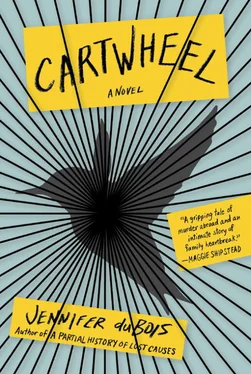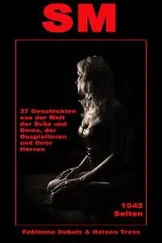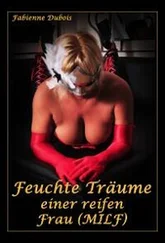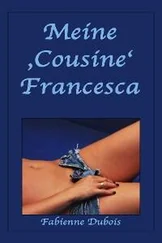“Okay,” said the man in the box. “You can come in now.”
Andrew squeezed Anna’s shoulder, and they walked through another set of metal detectors and down a long hall of blue doors. The light was dimmer here, and Andrew had trouble telling if the clots of darkness in the corners were dirt or only shadows. The blue doors ended and a glass-walled room began and there, sitting at a table, fingers spread out before her with an odd, unsettling sort of precision, was Lily.
Her head was bent forward. Her hair, Andrew could see, was very dirty. He couldn’t remember the last time Lily’s hair had been really dirty—maybe that time she’d had pneumonia for ten days when she was seven. She looked sallow, bony—a little Third World, Andrew couldn’t help thinking, though this was no longer a relevant term, post–Cold War. He could feel Anna startle against him, and he pressed his hand to her wrist. It was very important that neither of them seem startled.
The guard fumbled with his keys, rattling them. Lily still did not look up, and Andrew realized she couldn’t hear them. But she knew they were coming; shouldn’t she have been waiting, head raised, face expectant? The fact that she wasn’t seemed another bad sign, alongside the hair and that awful thing she was doing with her fingers.
The guard opened the door, and Lily finally looked up. The skin underneath her eyes was dark and dingy; her lips were very dry. Andrew flashed to an image of Janie—unconscious, intubated, her little macerated mouth a gaudy red, too gaudy for a two-year-old. The paleness of Lily’s skin now reminded him of the paleness of Janie’s skin then: It was the color of absence or impending departure. Andrew had expected Lily to stand, maybe even jump up, but she didn’t—she just smiled a sickly smile and waited for them to come to her.
“Dad,” she said. Andrew went to her and hugged her, taking some basic inventory as he did so. Up close she seemed about the right size, he supposed, like the same essentially sturdy child she’d always been (he remembered a picture of her on her fifth birthday, wearing some goofy little red jumper that Maureen had bought and that Anna wore later, her calf muscles straining as she stood on tiptoe to give a kiss to a man in an enormous Winnie-the-Pooh suit whom Maureen had hired for the occasion). Andrew grazed his hand along Lily’s forehead—her temperature seemed normal—and he squeezed her fingertips—like her mother, her circulation sucked, and her extremities were always getting too cold—but they seemed okay, just chilly, not frozen. He cupped the back of her head with his hand, a gesture that he knew was self-consciously maternal, that he knew he was copying from Maureen. It occurred to him briefly that it had been years since Lily would have allowed him such familiarities; since college began she’d become physically curt, a giver of hugs that seemed to communicate her general displeasure with the overall project of hugging. Andrew lingered for a moment with his hand on Lily’s head, just because he could. Then he stepped away so Anna could hug her—fiercely but swiftly, pulling away after a moment to stare at her feet.
Andrew sat. He left his hand in the center of the table, in case Lily wanted to hold it at any point. “Sweetheart,” he said. “How are you doing?”
Lily blinked, and Andrew could see shivering blue capillaries on her eyelids. Were they always like that? They were probably always like that. “When’s Mom coming?” she said.
“Next week,” said Andrew. “She’ll be here for your next visit. On Thursday.”
“Why isn’t she here now?”
“We’re going to trade off weeks, sweetheart.” Andrew was going to have to stop saying “sweetheart” with such frequency, he knew. Lily was not likely to tolerate it for long, and he did not want to know what it would mean if she did. “So you’ll always have a visitor. Every Thursday.” Lily’s innocence was implicit. It was implicit. Andrew would ask questions that reflected that. “How are you being treated?” he said, in the same moment as Anna leaned forward and said, urgently, “Lily. Are you okay?”
Andrew saw a momentary sardonic flash in Lily’s eyes—encouraging because it was so characteristic—but then it went away and Lily said, “I’m okay.” And Andrew knew then that she was protecting them, and he was afraid.
Lily stood up. “Dad,” she said. There was a wavering note of hysteria in her voice. She began to pace. “I have to tell you what happened.”
Andrew had never seen anyone pace before, and it was distressing. She really did look like one of those caged animals—her body seemed to register, at the edge of each cycle, that there was no place left to go; and she was doing something with her head that looked nearly equine—and he said, “Lily, do you want to sit down?”
“No,” she said. Andrew could hear something toddleresque in the dismissal—in the jejune thrill at having something to reject—and he realized that this was a small thing they could give her.
“Okay,” he said soothingly. “You don’t have to sit down.”
“Dad, I have to tell you.” Lily’s gaze was narrowing, and Andrew felt that she was on the verge of some kind of change in pitch.
“Lily,” he said quickly. “You don’t need to tell us anything.”
“I do.”
Andrew leaned forward and gestured to the ceiling. “Lily. You understand, right? You don’t need to tell us anything, if you don’t think you should.”
Lily looked at Andrew then with the most open and wrecked expression he had ever seen; it was an expression that was shattered, that was nearly autopsied. “Dad,” she said, close to sobbing. “Of course I should. What the hell do you think? Of course I should.”
“Okay, okay.”
Anna was silent: hands folded, face terrified.
“I was staying over at Sebastien’s,” said Lily.
Andrew nodded. “Sebastien is your boyfriend?”
Lily looked at him dimly. There was a time when she would have quibbled with this formulation; she would have said “lover” or maybe even “paramour,” or told him not to be so conventional, or asked him to remind her what century this was. Now she just shook her head and said, “No, I don’t think so.”
“Okay,” said Andrew, “but so, you were staying over there.”
“The Carrizos were gone for the weekend. That’s why I was staying over.”
“What did you do there?”
“Dad.”
“Okay.” Andrew hadn’t meant to ask any questions, but he did not know what he would say if he didn’t. “When did you get back?”
“Like, maybe, eleven? I went to the bathroom to shower. Someone hadn’t flushed the toilet, which I thought was weird. It wasn’t like Katy. She’s a very neat girl.”
Andrew could hear Lily struggling to manage her mouth here—the juggling act of teeth and tongue and saliva seemed to be eluding her, and there was a faint breathiness in her voice.
“There was,” she said. “There was also. I can’t see.”
“Put your head between your knees,” said Anna.
“Yeah,” said Lily, and did. She stayed there for thirty seconds, then carefully brought her head back up. “There was also some blood on the floor.”
“Some blood?” said Andrew casually. “Like, how much?” He wanted to stop with the questions, but he could not. At any rate, Lily seemed to be used to them.
“Like, not very much,” said Lily. “I thought maybe she’d cut herself. Or had her period and bled coming out of the shower or something. It wasn’t like her not to notice, though.”
“But you didn’t see her?”
“The door was closed. I thought she was still asleep. I went and got some cheese from the fridge and sat on the couch for a few hours watching some game show. I was pretty hungover, to be honest. I fell asleep for a while. When I woke up, it was much later—like maybe almost four. Excuse me.” She put her head down again. Andrew went to her and tried to wrap his arm awkwardly around her shoulder, but she shook him off. Anna tried, and Lily accepted this.
Читать дальше












